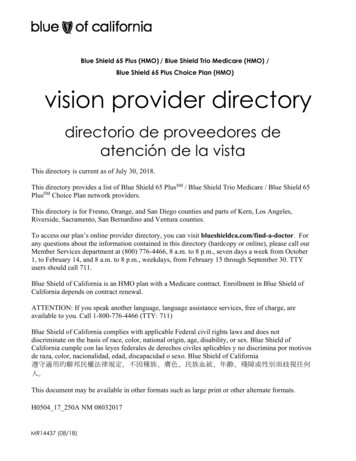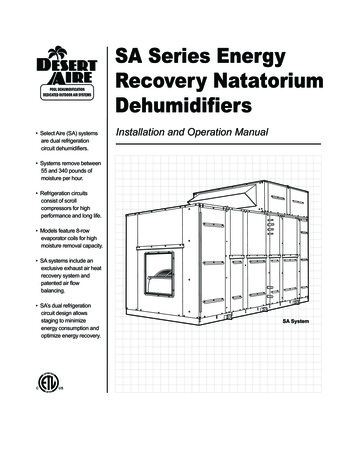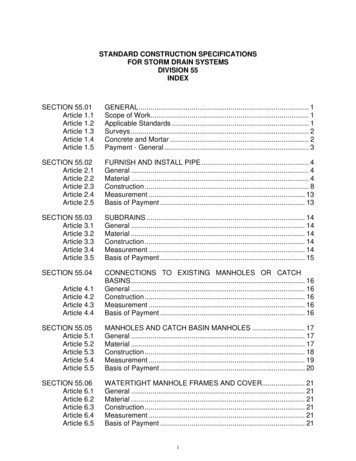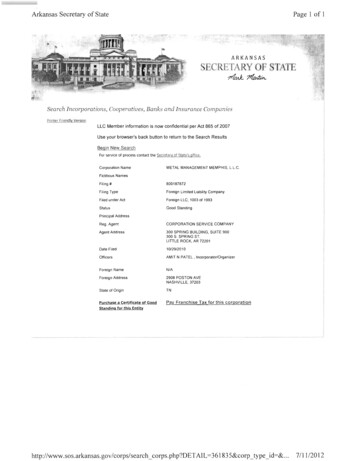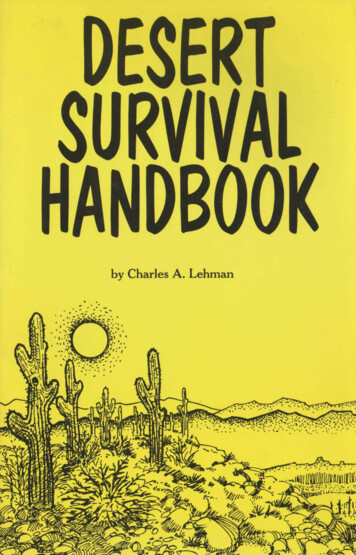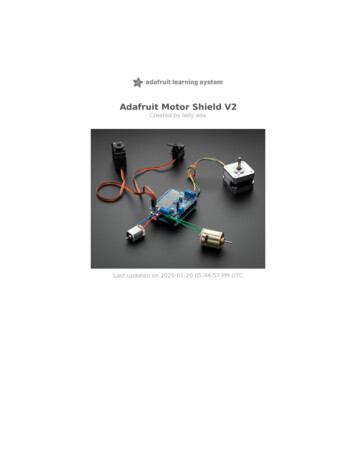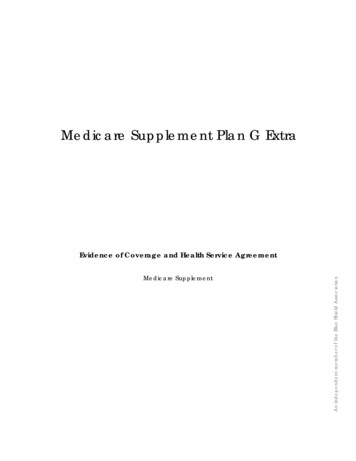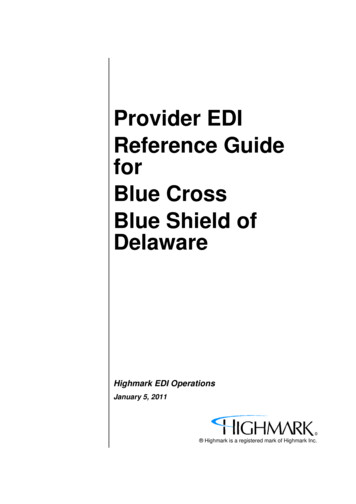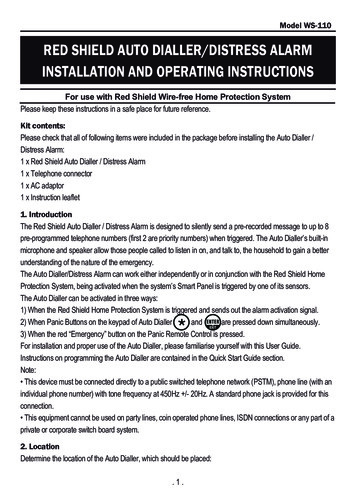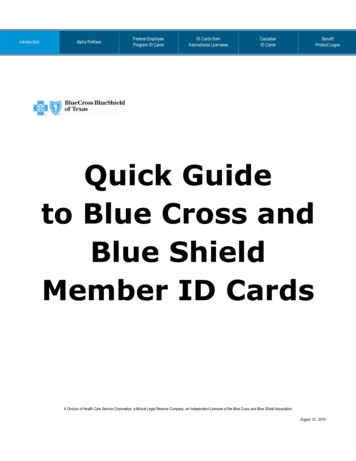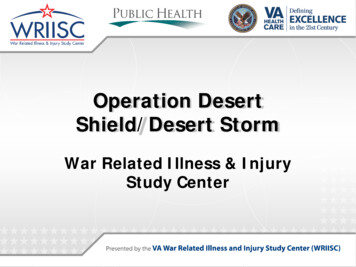
Transcription
Operation DesertShield/Desert StormWar Related Illness & InjuryStudy Center
Objectives The purpose of this WRIISC group post-deploymentexposure education visit is to: Inform Veterans of potential health hazards that maybe related to certain conflicts and military activities Increase Veterans’ awareness of VA’s postdeployment health resources and activities
Presentation OutlineIntroductionPotential ExposuresHealth EffectsVA Health CareOther VA Resources
Department of Veterans AffairsDepartment of Veterans AffairsVeterans HealthAdministration(Hospitals and Clinics)Veterans BenefitsAdministrationNational CemeteryAdministration
Who are we at WRIISC?We are a 2nd opinion referral center forcombat Veterans with difficult todiagnose illnessesWe provide education to Veterans andhealth care providers on postdeployment health concernsWe conduct clinical research on issuesrelated to post-deployment andVeterans’ health
Ground Troop Movements: 24-28 Feb 1991 Ground Troop Movements 24-28 February 1991
Potential ODSS ExposureConcerns CARC Paint Chemical and BiologicalWeapons Depleted Uranium Harsh living conditions Incoming fire, explosive events Industrial solvents andchemicals Infections Injuries, musculoskeletal wearand tearREF: WRIISC Clinical Reports Loud noises Oil Well Fires, Smoke, andPetroleum Pesticides Physical and Mental Stressors Pyridostigmine Bromide Sand, Dust, AirborneParticulate Matter Vaccinations
Gulf War Locator MapUnited States Army Public HealthCommand: https://usaphcapps.amedd.army.mil/gwf/entry.asp Provides estimates of oil well fire smokeexposure
Public Law 102-4 Public Law 102-4(Agent Orange Act of 1991) Provides the foundation toallow VA to obtainindependent scientific reviewof evidence regardingassociations betweendiseases and exposures.Established presumption ofexposure & serviceconnection for diseases. Institute of Medicine reviewsGulf War research and makesscientific recommendations toVA.
What are presumptions andwhy do we have them? Lack of reliable exposure data and specificcausal evidence Two-step presumption:If you were there You were exposedIf you were exposed and develop one of the conditions It is related to the exposure
Gulf War Associated ConditionsInfectious Disease: VA presumes the following infectious diseases are relatedto military service in the Southwest Asia theater ofoperations during the first Gulf War starting August 2,1990, through the conflict in Iraq and on or afterSeptember 19, 2001, in Afghanistan. Veterans must have the disease(s) within the time framesshown here and have a current disability as a result ofthat disease in order to receive VA disabilitycompensation.REF: www.publichealth.va.gov
Gulf War Associated ConditionsInfectious Disease: Malaria: An infectious disease caused by a parasite transmitted bymosquitoes. Symptoms include chills, fever, and sweats. It must be atleast 10 percent disabling within one year from the date of militaryseparation or at a time when standard or accepted treatises indicatethat the incubation period began during a qualifying period of militaryservice. Brucellosis: A bacterial disease with symptoms such as profusesweating and joint and muscle pain. The illness may be chronic andpersist for years. It must be at least 10 percent disabling within oneyear from the date of military separation. Campylobacter Jejuni: A disease with symptoms such as abdominalpain, diarrhea, and fever. It must be at least 10 percent disablingwithin one year from the date of military separation.REF: www.publichealth.va.gov
Gulf War Associated ConditionsInfectious Disease: Coxiella Burnetii (Q Fever): A bacterial disease with symptoms suchas fever, severe headache, and gastrointestinal problems such asnausea and diarrhea. In chronic cases, the illness may causeinflammation of the heart. It must be at least 10 percent disablingwithin one year of the date of military separation. Mycobacterium Tuberculosis: An illness that primarily affects thelungs and causes symptoms such as chest pain, persistent cough(sometimes bloody), weight loss and fever. Nontyphoid Salmonella: A condition characterized by symptomssuch as nausea, vomiting, and diarrhea. It must be at least 10 percentdisabling within one year of the date of military separation.REF: www.publichealth.va.gov
Gulf War Associated ConditionsInfectious Disease: Shigella: A condition characterized by symptoms such as fever,nausea, vomiting, and diarrhea. It must be at least 10 percentdisabling within one year of the date of military separation. Visceral Leishmaniasis: A parasitic disease characterized bysymptoms such as fever, weight loss, enlargement of the spleen andliver, and anemia. The condition may be fatal if left untreated. West Nile Virus: A disease spread by mosquitoes characterized bysymptoms such as fever, headache, muscle pain or weakness,nausea, and vomiting. Symptoms may range from mild to severe. Itmust be at least 10 percent disabling within one year from the date ofmilitary separation.REF: www.publichealth.va.gov
Gulf War Associated ConditionsMedically Unexplained Chronic Symptoms: Some Gulf War Veterans experience medically unexplained chronicsymptoms that can include fatigue, headaches, joint pain, indigestion,insomnia, dizziness, respiratory disorders, and memory problems. VA refers to these illnesses as "chronic multi-symptom illness" and"undiagnosed illnesses." Does not use the term “Gulf War Syndrome”when referring to medically unexplained symptoms reported by GulfWar Veterans. Why? Because symptoms often vary widely amongVeterans.REF: www.publichealth.va.gov
Chronic Multi-Symptom Illness Institute of Medicine definition: The presence of a spectrum of chronicsymptoms experienced for 6 months or longerin at least two of six categories—fatigue, moodand cognition, musculoskeletal, gastrointestinal,respiratory and neurologic—that may overlapwith but are not fully captured by knownsyndromes (such as irritable bowel syndrome,chronic fatigue syndrome, and fibromyalgia)REF: www.iom.edu
Gulf War Associated Conditions VA presumes certain chronic, unexplained symptoms existing for 6months or more are related to Gulf War service without regard tocause. These "presumptive" illnesses must have appeared duringactive duty in the Southwest Asia theater of military operations or byDecember 31, 2016, and be at least 10 percent disabling. Theseillnesses include: Chronic Fatigue Syndrome: a condition of long-term andsevere fatigue that is not relieved by rest and is not directlycaused by other conditions. Fibromyalgia: a condition characterized by widespread musclepain. Other symptoms may include insomnia, morning stiffness,headache, and memory problems.REF: www.publichealth.va.gov
Gulf War Associated Conditions Functional gastrointestinal disorders: a group of conditionsmarked by chronic or recurrent symptoms related to any part of thegastrointestinal tract. Functional condition refers to an abnormalfunction of an organ, without a structural alteration in the tissues.Examples include irritable bowel syndrome (IBS), functionaldyspepsia, and functional abdominal pain syndrome. Undiagnosed illnesses: symptoms that may include but are notlimited to: abnormal weight loss, fatigue, cardiovascular disease,muscle and joint pain, headache, menstrual disorders, neurologicaland psychological problems, skin conditions, respiratory disorders,and sleep disturbances.REF: www.publichealth.va.gov
Health Effects People respond to environmental exposures differently. The risk of developing health effects related to an environmentalexposure depends on many factors including: Chemicals to which you were exposedWhen you were exposed (as a fetus, child, adult)How much exposure you receivedHow long you were exposedYour genesAny other exposures to environmental or occupational hazards you may haveencountered during your lifetime Lifestyle choices (diet, tobacco or alcohol use, physical activity level) Illnesses you may have from other causes Medications taken during your lifetimeREF: www.atsdr.cdc.gov
Post-Deployment HealthResources There are a number of resources to assistVeterans who have post-deployment healthconcerns including: Post-deployment Integrated Care Initiative (PDICI):Health care providers integrated with primary carewho have post-deployment health expertise Environmental Health Clinicians and RegistryCoordinators War Related Illness and Injury Study Center
Evaluation If you have health concerns, it is importantto talk to your primary care provider to seewhat type of work up might be indicated: History and Physical Examination Diagnostic evaluation based onpresenting signs and symptoms ofVeteran. In some instances, furtherlaboratory or diagnostic testing may beindicated. Toxicology tests often of limited valuesince they can not confirm remoteexposures Depleted Uranium 24-hour urine testmay be indicated
GW Registry (includes OIF and OND),DU Registry and Upcoming Burn PitRegistryWhy does VA have registries?How and where do Veterans get on the registries?What does a Veteran get from a health registry exam?Can a Veteran repeat the registry examination?Can Veteran family members receive health registry exams?
Gulf War Registries Registries: Gulf War gulfwar/registry exam.asp DU epleted uranium/followup program.asp Airborne Hazards and Open Burn Pit urnpits/action-plan.asp Gulf War Review Newsletter Sign up for free at:http://www.easmailcall.aac.va.gov/ Gulf War Review Newsletter PDF available /publications/index.asp VA Environmental Health Coordinators ors.asp
Gulf War Registry(144,443 Veterans as of 1/21/14) Free, no-enrollment requiredNot a compensation examinationDoes not confirm exposureProvides an opportunity to discuss health concerns with a VA provider with knowledge ofmilitary specific exposuresAn outreach tool to connect Veterans with available resourcesGulf War Exams by Year3000025000Female F/UFemale IMale F/UMale I2000015000100005000REF: VA Office of Public 901987198319820
Depleted Uranium Follow Up Program VA and the Department of Defense established the Depleted Uranium Follow-UpProgram at the Baltimore VA Medical Center to screen and monitor Veterans forhealth problems associated with exposure to depleted uranium (DU). This program isespecially geared to Veterans who were on, in or near vehicles hit with "friendly fire";rescuers entering burning vehicles, and those near burning vehicles; salvagingdamaged vehicles; or near fires involving DU munitions.VA requires active duty service in any of the conflicts listed to qualify for the DUFollow-Up Program:1990-1991 Gulf War, Bosnia, Operation Enduring Freedom,Operation Iraqi Freedom, Operation New Dawn.If a Veteran has health concerns about DU, they can talk to their VA primary careprovider or environmental health clinician at their VA medical center to discusswhether a DU urine test or further testing might be indicated.To date, no health problems associated with DU exposure have been found inVeterans exposed to DU. Researchers and clinicians continue to monitor the healthof these Veterans.REF: www.publichealth.va.gov
VA Health Care Resources Gulf War exposure Information ndex.aspMy HealtheVet https://www.myhealth.va.gov/index.html Access Secure Messaging through Premium account Access to many parts of your VA medical recordFamily support at Vet Centers http://www.va.gov/directory/guide/vetcenter flsh.aspCaregiver support services: http://www.caregiver.va.gov/ 1-855-260-3274Crisis Care Hotline 1-800-273-8255 press 1
VA Benefits Administration Compensation and Pension Program VA Benefits Process:Complete: VA Form 21-526 or VA Form 21-4138REF: www.benefits.va.govCompensationand PensionExaminationFollow up withall VBArequestsAppealProcess
Compensation DisabilityBenefits - FAQs Monthly payment rates are based on the Veteran’s combined rating for hisor her service-connected disabilities. These ratings are based on theseverity of the disabilities.For presumptive service connected conditions, VA requires: a medical diagnosis of a disease which VA recognizes as beingassociated with Gulf War service, competent evidence of service in Gulf War, and competent medical evidence that the disease began within the deadline(if any).Under the law, Veterans are eligible for benefits if they served in OperationDesert Shield/Desert Storm and who have a disease that VA recognizes asbeing associated with Gulf War service.Survivor benefits may be available.REF: www.benefits.va.gov
Compensation DisabilityBenefitsAvailableResourcesto AssistwithApplications VA Web site (www.benefits.va.gov) File electronically at www.ebenefits.va.gov Veterans Benefits AdministrationCounselors Veteran Service Organization Counselors Vet Centers Information on how to apply for Gulf Warrelated conditions: tservice-index.asp fits.portal? nfpb true& nfxr false& pageLabel VsoSearch
Important Contact InformationVeterans BenefitsAdministration:800-827-1000 ext. 110www.benefits.va.govWashington, D.C.VAMC AppointmentLine:(202) 745-8577VA Gulf War help line:1-800-749-8387DC Gulf War RegistryMs. Ruby Rauf:(202) 745-8419Washington D.C.WRIISC:1-888-722-8340 Call us to arrange a one-onone exposure consultation.
What Now? We cannot change exposures that occurred in the past.However, there are strategies you can take to help optimize your overallhealth: Talk to your doctor if you have health concerns Try to prevent future potential exposures Engage in healthy lifestyle choices Regular check-ups Health screenings If you smoke, quit If you drink alcohol, drink in moderation Regular exercise Well-balanced diet Manage stress Good sleep Social supports
Our Contact Information:War Related Illness and Injury StudyCenter (WRIISC)Email: wriisc.dc@va.govPhone: 1-800-722-8340Website: www.warrelatedillness.va.gov
Questions?
Gulf War Associated Conditions Infectious Disease: Malaria: An infectious disease caused by a parasite transmitted by mosquitoes. Symptoms include chills, fever, and sweats. It must be at least 10 percent disabling within one year from the date of military separation or at a time when standard or accepted treatises indicate
